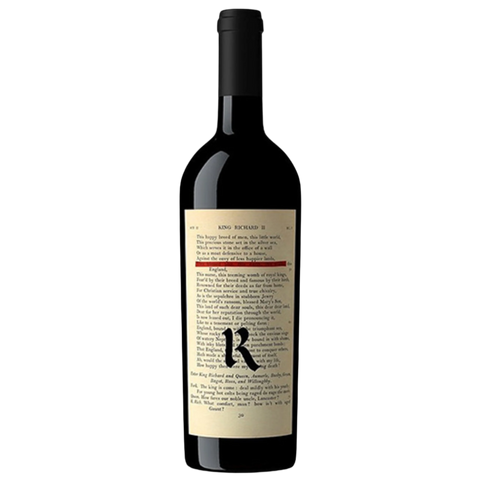
2021 Realm Cellars "The Bard" Red, Napa Valley, California
A Bordeaux-style blend that sources fruit from all over Napa Valley. Full-bodied, dense and fruit forward.
There are 14 units left in stock.
ABOUT THIS WINE
From the Producer: "The flagship of Realm’s portfolio, The Bard is the Cabernet Sauvignon-dominated Proprietary Blend we’ve made since 2003. We consider The Bard to be the most dynamic expression of Napa Valley: a blend of grapes from Coombsville to Calistoga, from the east to the west sides, from the hillsides to the valley floor. Dense, weighty, and concentrated, The Bard always punches above its weight, and with multiple dimensions coming together in harmony, there is more than meets the eye in this complex wine. Outstanding vineyards such as Beckstoffer To Kalon, Beckstoffer Bourn, Blair, Houyi, Larkmead, Realm SLD Estate, Farella, Orchard and Bettinelli Upper Range have all found a place in the wine. While the composition of The Bard varies from year to year, Cabernet Sauvignon typically comprises over 70% of the blend, joined by lesser percentages of Merlot, Cabernet Franc and Petit Verdot."
ABOUT THIS PRODUCER
From the Producer: "There has always been change in Napa Valley. We tend to think the modern history of Napa Valley begins in 1966 with pioneers like Robert Mondavi, Jack Cakebread, Joe Phelps, John Shafer, Jim Barrett, Jack and Jamie Davies, Al and Boots Brounstein and others. 1966 was the inaugural vintage of Robert Mondavi Winery, which was the first new winery to open in Napa Valley after Prohibition. The era was defined by trial and error, converting cattle pastures and orchards to vineyards, experimenting with clones and rootstocks, and the first generation of legendary winemakers from places like the University of California at Davis. Most wine was sold through wholesale distribution. It was an era of rising tides and shared optimism about the potential of this nascent winegrowing region.
The next era emerged somewhere around 1990 with the arrival of domaines such as Harlan Estate, Screaming Eagle, Araujo Estate, Colgin Cellars, Dalla Valle, etc. These well-funded vintners came to Napa Valley with different philosophies, sensibilities and business models. They purchased land and farmed it with an obsessive focus on quality. They hired vineyard and winemaking consultants, producing limited amounts of high-quality wine, primarily Cabernet Sauvignon and red blends. They became known as “cult” wineries, selling their wines directly to dedicated followers and mostly bypassing the wholesale distribution system. Would-be customers waited years to access their high-scoring wines. Scarcity was practically the point. Over time, more people came to Napa Valley with similar dreams and ambitions. The number of small, high-end wineries ballooned, as did the price of land. A new model emerged: producers who purchased grapes from pedigreed growers and promising vineyards to make their own limited production wines. Realm Cellars was among them.
Fast forward to 2023, and we see a natural and accelerating changing of the guard, as legacy and cult wineries, particularly family-owned entities, are being sold for a variety of reasons. We see the beginning of a new era, one that has yet to be fully defined. As we have often said at Realm, we stand on the shoulders of those who came before us. Now it is our turn to make our mark. As landowners and stewards of three properties here, we have both an opportunity and a responsibility to shape how the valley evolves. We know great risks and uncertainties lay ahead. Indeed, “uncertainty” – in the marketplace, the regulatory landscape, the environment - might be the defining characteristic of this new era. Undoubtedly the greatest risk is climate change, an existential challenge coming into ever more severe focus. A changing habitat is something Napa Valley will and must face as a community; it will take extraordinary effort, intelligence and perseverance to continue farming and making wine in this valley. Realm has an ever-growing role to play in this collective effort."
Details:
| Grape(s) | Cabernet Sauvignon, Merlot, Cabernet Franc, Petit Verdot |
| Farming | Traditional |
